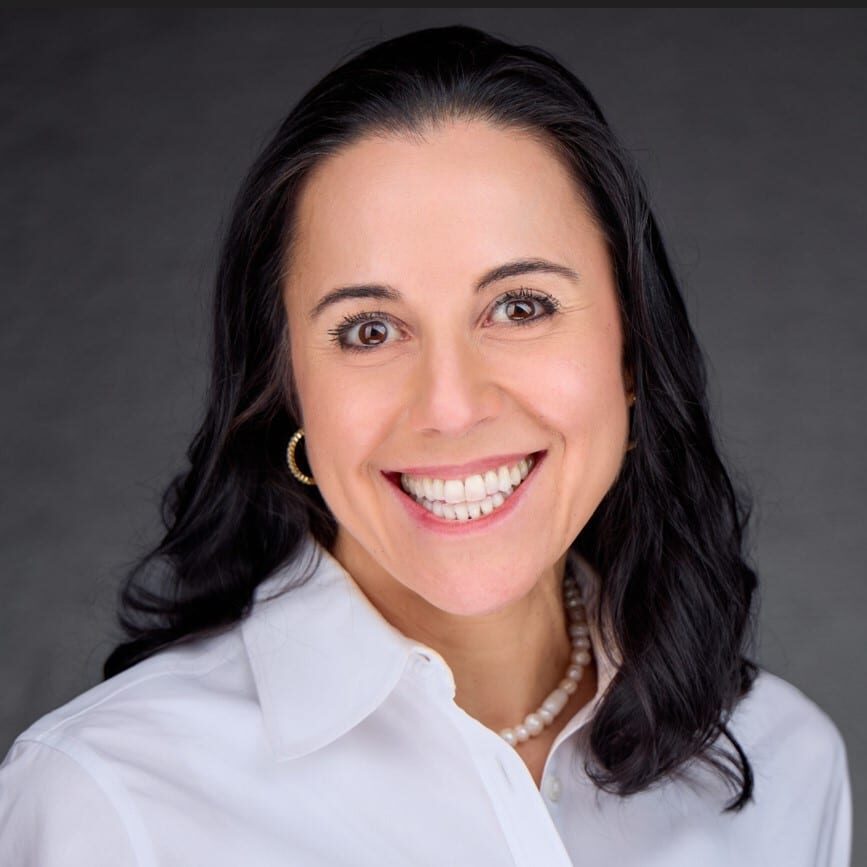
Dr. Ackerman has been an annual Leaders Society member of the Dermatology Foundation since she completed her residency in 2007. She is now an Annenberg Circle member, as well as a member of our Advisory Council, and is actively involved in our physician-to-physician fundraising efforts. Dr. Ackerman took some time out to talk to us about how important the work of the DF is to the specialty as a whole and the practicing physician.
The Importance of Dermatologists Supporting the Future of Dermatology
DF: Happy Friday, Dr. Ackerman.
Dr. Ackerman: Happy Friday of a holiday weekend—I’m not on call this weekend either!
DF: I didn’t realize that dermatologists have to be on call!
Dr. Ackerman: Well, I’ll put a little tidbit in your cap to think about then. Yes, some dermatologists do take call, and I think of it as a part of the privilege of being a physician—the opportunity to help people when they need you.
DF: What a nice way to put it, and what a thoughtful way to start.
Dr. Ackerman: With great privilege comes great responsibility.
DF: Yes! Please tell us how you first learned about the Dermatology Foundation.
Dr. Ackerman: I remember vividly when I first learned about the DF from Elizabeth McBurney, one of my dear friends, mentors, and one of our esteemed faculty at Tulane University, Department of Dermatology, where I was training.
She gave a presentation on the Dermatology Foundation every year. The first year I heard it I was a first-year resident. I didn’t have the resources at the time to contribute but she asked in an incredibly polite, yet proud way for us to think about where we wanted the future of dermatology to be and how we could best contribute to that want. At that meeting, I committed to myself that as soon as I was done with my training, and had an income of any real substance, I wanted to contribute.
DF: That’s wonderful! When did you become a member?
Dr. Ackerman: I finished my training in 2007 with an additional year of training as a complex medical dermatology fellow at Tulane University from 2007 to 2008, so it was in my fellowship year that I joined the Leaders Society
I wasn’t making big bucks, but enough to honor the commitment I had made. I had the privilege of pursuing the career I wanted, and not everyone gets to do that, and again with privilege, comes responsibility.
DF: I’m hearing a theme here. What inspires you to devote so much time to the Dermatology Foundation?
Dr. Ackerman: You know, I genuinely wake up every day and love my job. I’ve been in practice here in Phoenix for almost 16 years, and I’ve never left the office not feeling like I was able to do something meaningful for someone. And I don’t know of any other career that one could pursue that gives them that reliable amount of reward.
DF: I’ve interviewed many dermatologists this year, and there has been a consistent feeling among them of gratitude—joy that they get to do this every day and serve in this way.
Dr. Ackerman: You’re observant. I think as a field we are incredibly privileged to have this opportunity to practice dermatology.
And I think the Dermatology Foundation has allowed for our field to be anything but stagnant. Our field is so small but so very, very mighty in the House of Medicine in so many ways. We are innovators, thought leaders, creative thinkers and we deeply care about the patients we serve. I might not be a bench researcher, but I want to support those within dermatology who take our fields further by doing that work and continue to enhance the facile-ness of how we get to practice.
DF: How has your involvement with the Dermatology Foundation evolved over the years?
Dr. Ackerman: Financially, as I have had greater ability, I have been able to contribute more, moving from the Leaders Society to the Annenberg Circle. I’ve been the Leaders Society State Chair for Arizona since 2008, and I commit as much time as I can.
Some years are better than others—the year my twins were born, and I had a two-year-old, I didn’t have a lot of time. But I find windows and networking opportunities, and there are always emails and other ways that we can ‘meet’ our colleagues to make the ‘ask’.
My goal is always to help bring in a few new contributors every year along with getting renewals from the former contributors as well.
DF: Of all the professional organizations you support, how does the Dermatology Foundation stand out?
Dr. Ackerman: There’s certainly something very unique about the DF, and that is that the Dermatology Foundation’s entire platform is built upon the premise of, if not us, who?
We need to believe in the specialty itself by funding early and mid-career physicians who have a primary interest in allowing this field to become anything but stagnant, pushing the envelope, and moving the needle forward in science, pushing the “testing”, even with multiple failures.
Without the seed funding early on in their career, they would have no greater opportunities, like NIH grants, and there is no other organization than the Dermatology Foundation that does that.
DF: Would you share with us how you got into dermatology? Did you find it, or did it find you?
Dr. Ackerman: I love this question. I thought I was going to be a professional football player. Then my mom had this talk with me that it probably wasn’t going to happen. But I could still dream big! But then I had an ACL injury in high school while playing basketball and I was all of a sudden, a patient for the first time.
I found the work my surgeon was doing very intriguing. So, it was a little bit of an “antenna-up” for me at that time. From there, I delved into my science classes with a little bit of a different lens and thought, maybe, I want to be a doctor one day.
I went to college and was really captivated by my first set of courses, which were heavily in the sciences and biomedical coursework. I pursued the pre-medical curriculum and started shadowing physicians the summer after my freshman year in college. At that time, you could just connect with your local friendly cardiothoracic surgeon and go into an OR.
I was asked by my father, whose friend was a dermatologist and had just hired a young female dermatologist out of residency to join his practice, if I would want to shadow her. And I was like, “Dad, can’t you get me in on any other open-heart surgery or something? But I have to tell you, I still remember the first day I shadowed the dermatologist. There was this resonance that there was science, fixing people, and a deeper human connection.
When I went back to college at Penn in my sophomore year I was able to choose research in either their melanoma clinic or their breast cancer clinical research facility, and I chose the melanoma facility, and for the next two and a half years, I helped as an assistant in a clinical a trial. This was my first real engagement in the thought that maybe I would, maybe I could, become a dermatologist. I then became engaged in various specialty rotations, and as I rotated through them in my third and fourth years of medical school, and that was what made it clearer, that I was really impassioned by the work of what dermatology offered.
I was an athlete, so this team-sport mentality, wherein I would be working with someone on something that we could both see and appreciate really felt good to me. I also love the idea of practicing in a field of medicine wherein there are meaningful relationships forged over time.
Skin can also tell an incredible story about what’s going on in the inside world of the body, and that is a fascinating reality we should cherish.
DF: What do you think has been the most significant impact that the DF has made in the last 60 years?
Dr. Ackerman: The truth is, I look at the Dermatology Foundation as the umbrella organization that gives us a strong pipeline of support for the future. The DF has positioned itself with the mission of, “We want to fund dermatologists early in their career. We want to make sure there’s a pipeline of new science being developed at a high level by dermatologists, for dermatologists, and their patient population.”
And to me, that’s their biggest contribution. It’s not a single project. It’s the foundation itself and the principles on which it was built.
DF: Thank you. Where do you hope to see dermatology advance in the next 60 years?
Dr. Ackerman: So, in truth, I hope dermatology advances in the next 60 years in a way that is much like how we started this conversation when, fortuitously, you just happened to say, “oh I didn’t know dermatologists were on call.”
I think the lens needs to change on who we are and what we do. I think there’s a tremendous delta between reality and the public perception of us as a subspecialty. But the Dermatology Foundation plays a role as they continue to create newer and better diagnostics and scientific determinations behind disease evolution and ways, we can treat patients.
The DF is creating this platter of opportunity for all of us to go out there and get the work done and continue to prove that we are important in the house of medicine, we are important to patients, and that we have real science behind real diseases that need real management.
DF: Where do you hope to see dermatology evolve in the next 60 years?
Dr. Ackerman: I want to ensure in my career that I do something to increase the viability of the pipeline of doctors who want to do this work and want to practice complex medical dermatology, and pediatric dermatology, the fields where we have very few doctors saying, “sign me up”. I would love to see that change.
I would love to see cures for inflammatory diseases that we have to treat with chronic management at this point.
DF: Why is it important for other dermatologists to support the Dermatology Foundation?
Dr. Ackerman: I think that sometimes it’s easy to ride the wave. But so many things we do reflexively in our offices every day were driven by the work of people who came before us.
If we are not behind the future of our specialty, then who? Again, with great privilege, comes great responsibility.
DF: We end as we began. Thank you so much for this interview!
Dr. Ackerman: Thank you!


